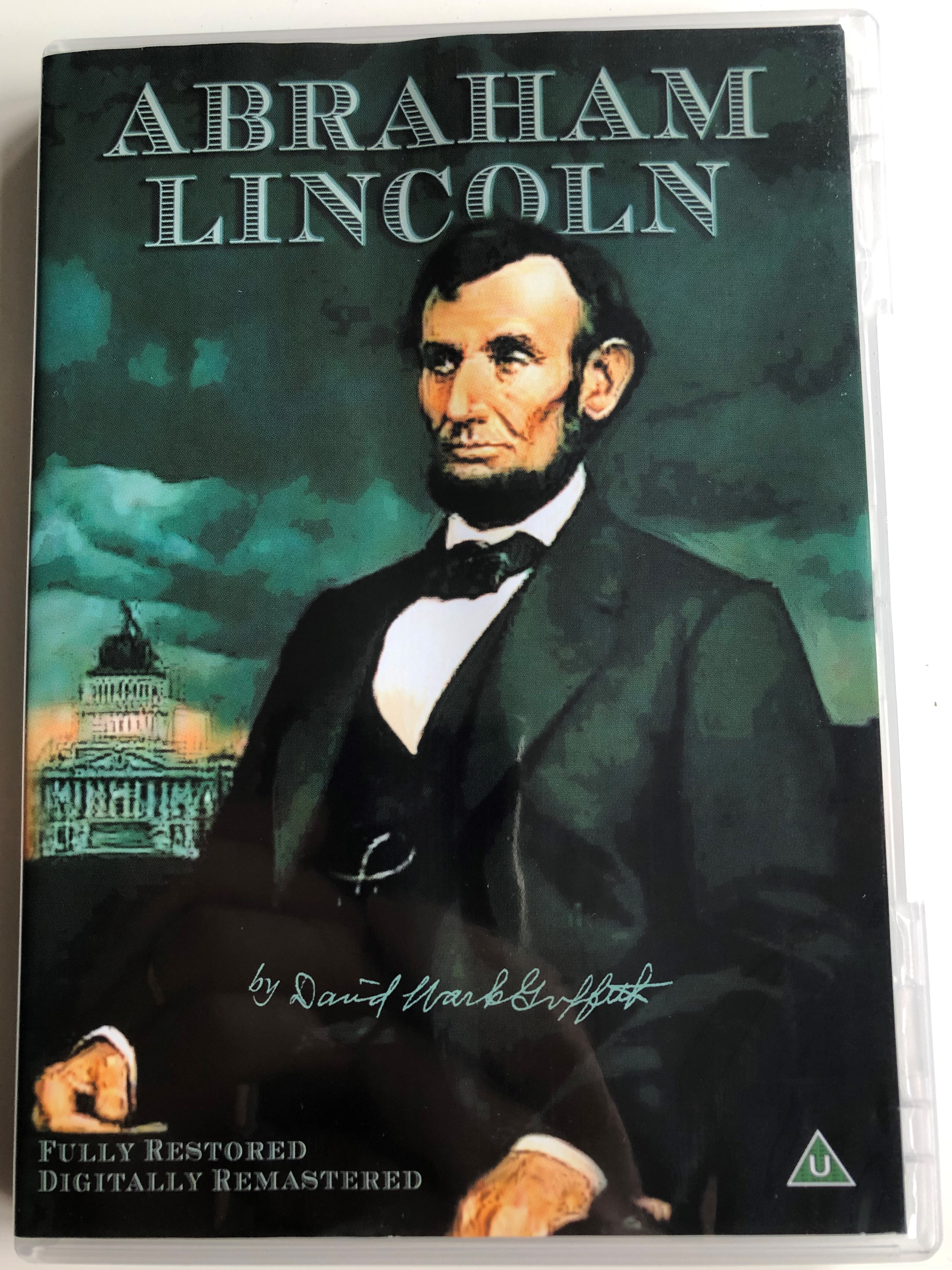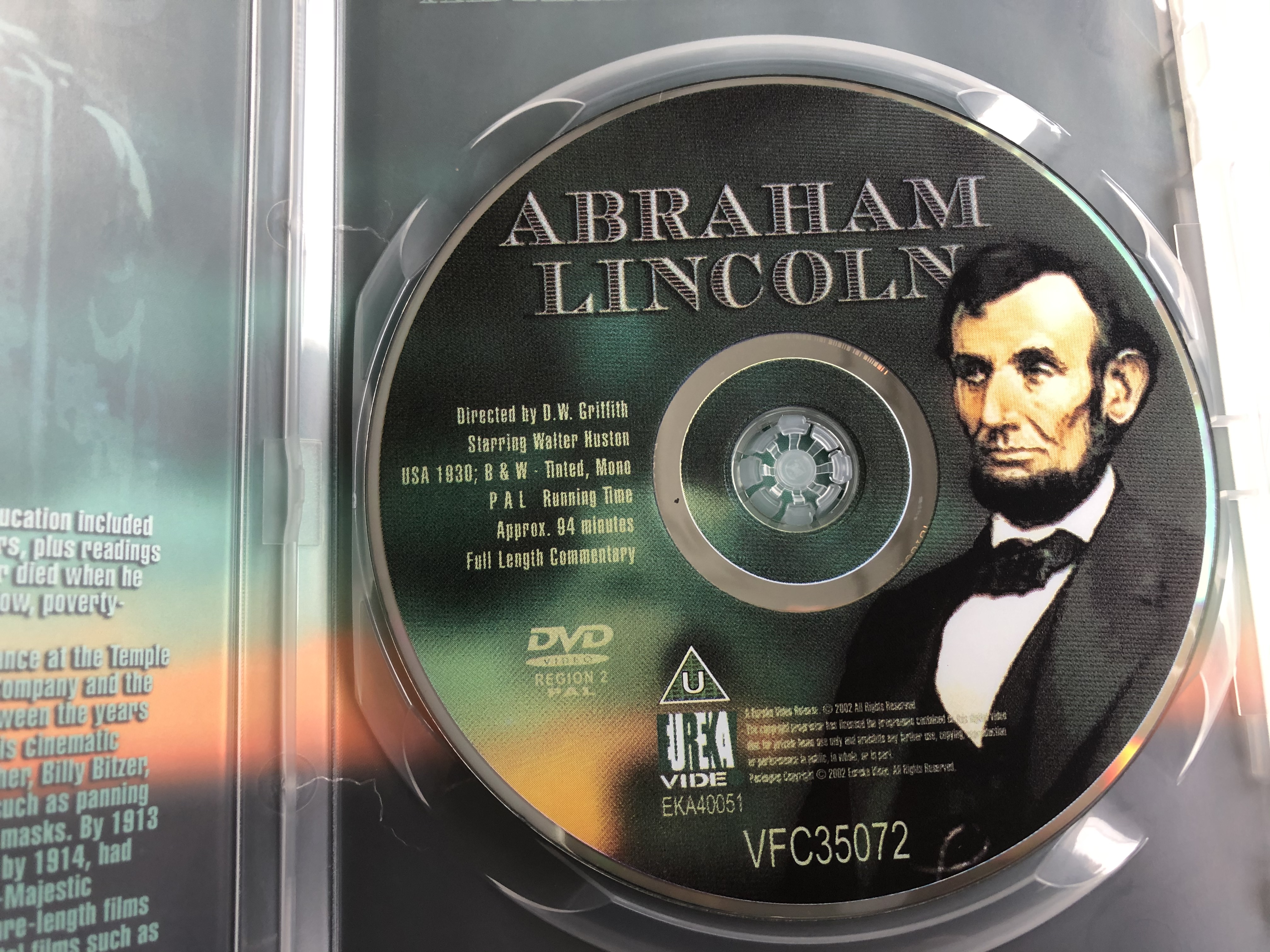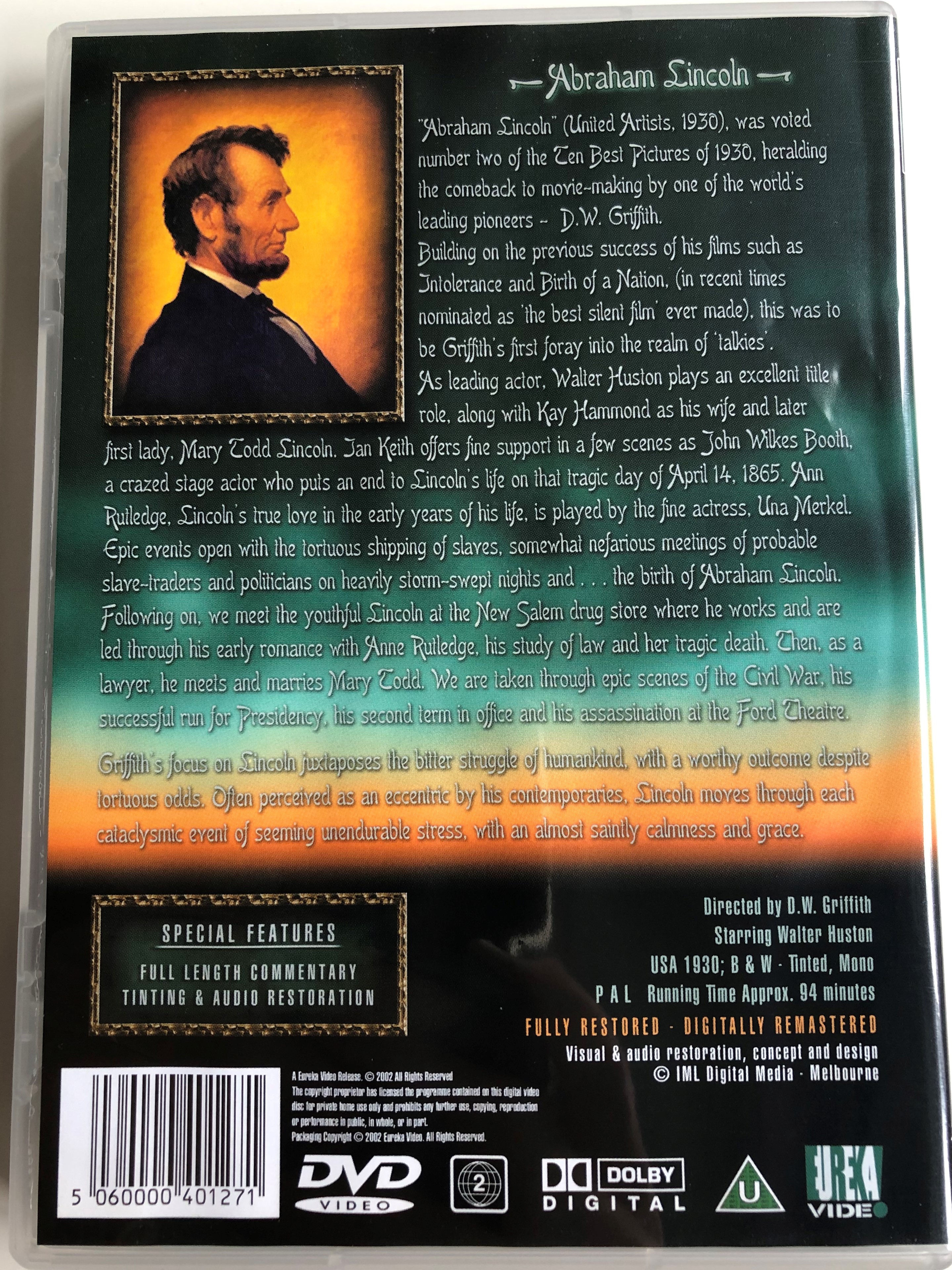Description
Abraham Lincoln DVD 1930 / Directed by D. W. Griffith / Starring: Walter Huston, Una Merkel / Full length Commentary, Tinting & Audio Restoration
UPC 5060000401271 / VFC35072
MADE IN EU
REGION 2 PAL DVD
Audio: English mono
Runtime: 94 minutes
English Summary:
Abraham Lincoln, also released under the title D. W. Griffith's "Abraham Lincoln", is a 1930 pre-Code American biographical film about Abraham Lincoln directed by D. W. Griffith. It stars Walter Huston as Lincoln and Una Merkel, in her second speaking role, as Ann Rutledge. Her first speaking role was in a short film, Love's Old Sweet Song (1923) filmed in the Phonofilm sound-on-film process. The script was co-written by Stephen Vincent Benét, author of the Civil War prose poem John Brown's Body, and Gerrit Lloyd. This was the first of only two sound films made by Griffith.
The film entered the public domain in 1958 when the initial copyright expired. The copyright holders did not elect to extend it for a second 28 year term.
The first act of the film covers Lincoln's early life as a storekeeper and rail-splitter in New Salem and his early romance with Ann Rutledge, and his early years as a lawyer and his courtship and marriage to Mary Todd in Springfield. The majority of the film deals with Lincoln's presidency during the American Civil War and culminates with Lee's surrender and Lincoln's assassination at Ford's Theatre.
Cast:
- Walter Huston as Abraham Lincoln
- Una Merkel as Ann Rutledge
- W. L. Thorne as Tom Lincoln
- Lucille La Verne as Mid-Wife
- Helen Freeman as Nancy Hanks Lincoln
- Otto Hoffman as Offut
- Walter Huston as Abraham Lincoln
- Edgar Deering as Armstrong
- Una Merkel as Ann Rutledge
- Russell Simpson as Lincoln's Employer
- Charles Crockett as Sheriff
- Kay Hammond as Mary Todd Lincoln
- Helen Ware as Mrs. Edwards
- E. Alyn Warren as Stephen A. Douglas
- Jason Robards as Herndon
- Gordon Thorpe as Tad Lincoln
- Ian Keith as John Wilkes Booth
- Cameron Prudhomme as John Hay (secretary to the president)
- James Bradbury, Sr. as General Scott
- Jimmie Eagle as Young Soldier
- E. Alyn Warren as General Grant
- Oscar Apfel as Secretary of War Stanton
- Frank Campeau as General Sheridan
- Hobart Bosworth as General Lee
- Henry B. Walthall as Colonel Marshall
| Directed by | D. W. Griffith |
|---|---|
| Produced by | D. W. Griffith Joseph M. Schenck |
| Written by | Stephen Vincent Benet John W. Considine, Jr. Gerrit Lloyd D. W. Griffith (uncredited) |
| Starring | Walter Huston Una Merkel |
| Music by | Hugo Riesenfeld |
| Cinematography | Karl Struss |
| Edited by | James Smith |
|
Production
company |
United Artists
|
| Distributed by | United Artists |
|
Release date
|
August 25, 1930 |
|
Running time
|
94 minutes |
| Country | United States |
| Language | English |
Abraham Lincoln (/ˈlɪŋkən/; February 12, 1809 – April 15, 1865) was an American statesman and lawyer who served as the 16th president of the United States from 1861 to 1865. Lincoln led the nation through the American Civil War, the country's greatest moral, constitutional, and political crisis. He succeeded in preserving the Union, abolishing slavery, bolstering the federal government, and modernizing the U.S. economy.
Lincoln was born into poverty in a log cabin and was raised on the frontier primarily in Indiana. He was self-educated and became a lawyer, Whig Party leader, Illinois state legislator, and U.S. Congressman from Illinois. In 1849 he returned to his law practice but became vexed by the opening of additional lands to slavery as a result of the Kansas–Nebraska Act. He reentered politics in 1854, becoming a leader in the new Republican Party, and he reached a national audience in the 1858 debates against Stephen Douglas. Lincoln ran for President in 1860, sweeping the North in victory. Pro-slavery elements in the South equated his success with the North's rejection of their right to practice slavery, and southern states began seceding from the union. To secure its independence, the new Confederate States fired on Fort Sumter, a U.S. fort in the South, and Lincoln called up forces to suppress the rebellion and restore the Union.
David Wark Griffith (January 22, 1875 – July 23, 1948) was an American film director. Widely considered as the most important filmmaker of his generation, he pioneered financing of the feature-length movie.
His film The Birth of a Nation (1915) made investors a profit, but also attracted much controversy, as it depicted African Americans in a negative light and glorified the Ku Klux Klan. Intolerance (1916) was made as an answer to his critics, but not as an apology for the negative images of African Americans in film. Several of Griffith's later films were also successful, including Broken Blossoms (1919), Way Down East (1920) and Orphans of the Storm (1921), but the high costs he incurred for production and promotion often led to commercial failure. He had made roughly 500 films by the time of his final feature, The Struggle (1931).






























